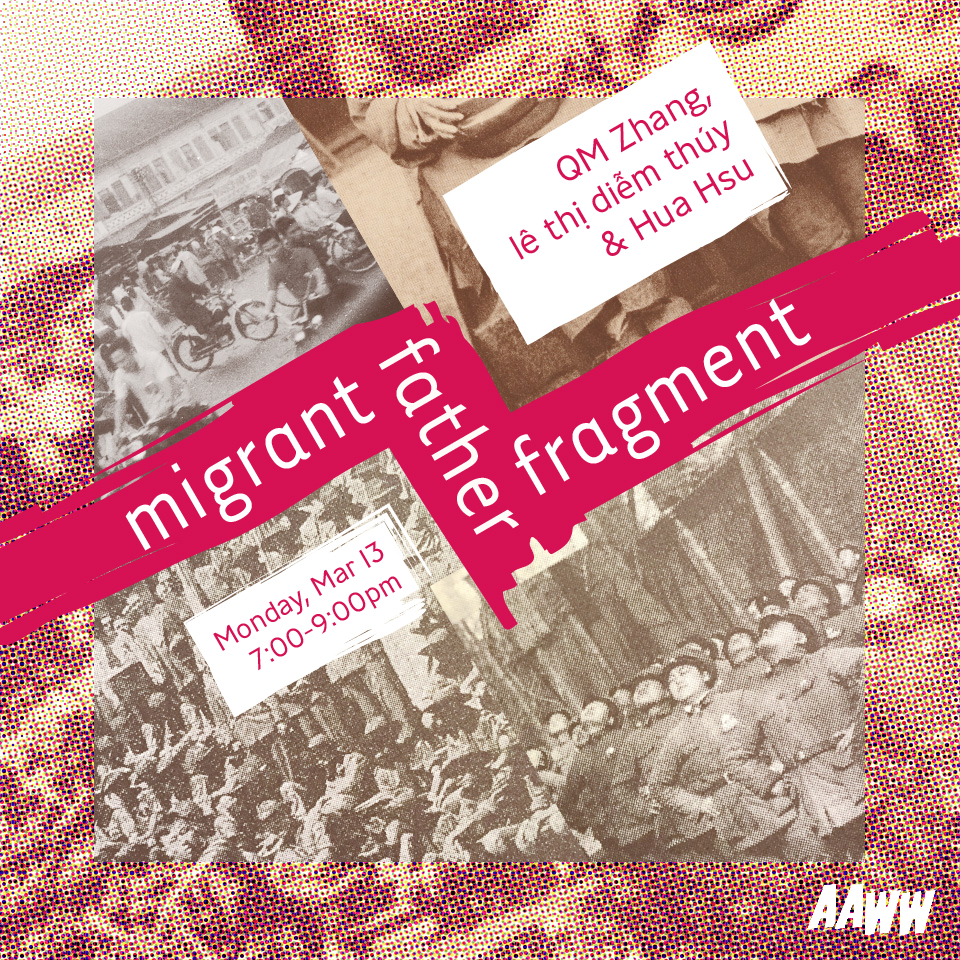
Join us for a night featuring writers of fragmented, hybridic family narratives that explore themes of immigration, grief, and the father: Q.M. Zhang and lê th? di?m thúy, who’ll talk with The New Yorker’s Hua Hsu. A hybrid memoir/novel that’s part espionage, part historical documentary, Q.M. Zhang’s Accomplice to Memory tells the story of her father’s mysterious exodus from China during the country’s Civil War and WWII: all the silence and love that you’ve come to know from your Asian immigrant family, but with added subterfuge and geopolitics. We also have a rare AAWW appearance of Guggenheim Fellow lê th? di?m thúy, whose The Gangster We Are All Looking For–a recent Asian American classic–tells the collage-like semi-autobiographical story of a refugee family that immigrates to San Diego, leaving behind a stark past of war and liberation in Vietnam.
RESERVE A SEAT!
$5 SUGGESTED DONATION | OPEN TO THE PUBLIC
In Accomplice to Memory (Kaya Press 2017), Q.M. Zhang explores her father’s mysterious past in China when he is suddenly hospitalized. Armed with history books and timelines, Zhang sits at her father’s bedside recording accounts of love, espionage and betrayal, attempting to parse out the truth. Reminiscent of W.G. Sebald’s incorporation of text and image, this page-turner explores the silences and subterfuge of an immigrant parent, and the struggles of the second generation to understand the first. As Paisley Rekdal writes, “History is filled with the voiceless and the nameless, those who have disappeared into obscurity. Accomplice to Memory works to revive the lost, to memorialize the author’s father, and the many thousands who fled the wars that roiled China during the 20th Century.”
The Gangster We Are All Looking For (Knopf 2003) by lê th? di?m thúy also explores themes of immigration and family trauma through a fractured, montage-like vignettes and an interest in visuality. Working magically between fiction, poetry, and the essay (one chapter was originally published in Best American Essays), the book takes place in 1978 San Diego and follows six refugees who have migrated from Vietnam–including the narrator’s father who is the eponymous gangster of the title: former South Vietnamese soldier and possible black market operator, current brooding drunken migrant in America. As the New York Times writes, “lê th? di?m thúy’s first novel is a refugee’s story — a story of Vietnam and America, of youthful yearning and adult resignation, of unimaginable loss and of the tenacity of memory…. Time and place and viewpoint shift constantly, as memories of Vietnam are interwoven with incidents in the United States. Past and present meld, conveying the fluidity of time itself…. It is as vivid as a fairy tale, as allusive as a poem.”
New Yorker contributor and AAWW Board Member Hua Hsu’s new book A Floating Chinaman (Harvard University Press 2016) explores how Twentieth Century American authors and intellectuals talked about and imagined China–with a particular focus on H.T. Tsiang, the avant-garde author of The Hanging on Union Square, recently revived by Kaya Press. Read about Hua’s experience writing the book in AAWW’s The Margins–as well as him talking with Ashok Kondabolu. Hua is an Associate Professor of English at Vassar College and Fellow at the New America Foundation.
/\ /\ \/\/ \/\/

![[IN-PERSON] AAWW & The Strand Present: Eddie Ahn & Kristen Radtke - Advocate](https://aaww.org/wp-content/uploads/2024/04/4-24-24-Advocate-1200x628_2x-v2.png)
![[IN-PERSON] SEJAL SHAH PRESENTS HOW TO MAKE YOUR MOTHER CRY, WITH MINNA PROCTOR](https://aaww.org/wp-content/uploads/2024/03/MotherCry_IG.png)
